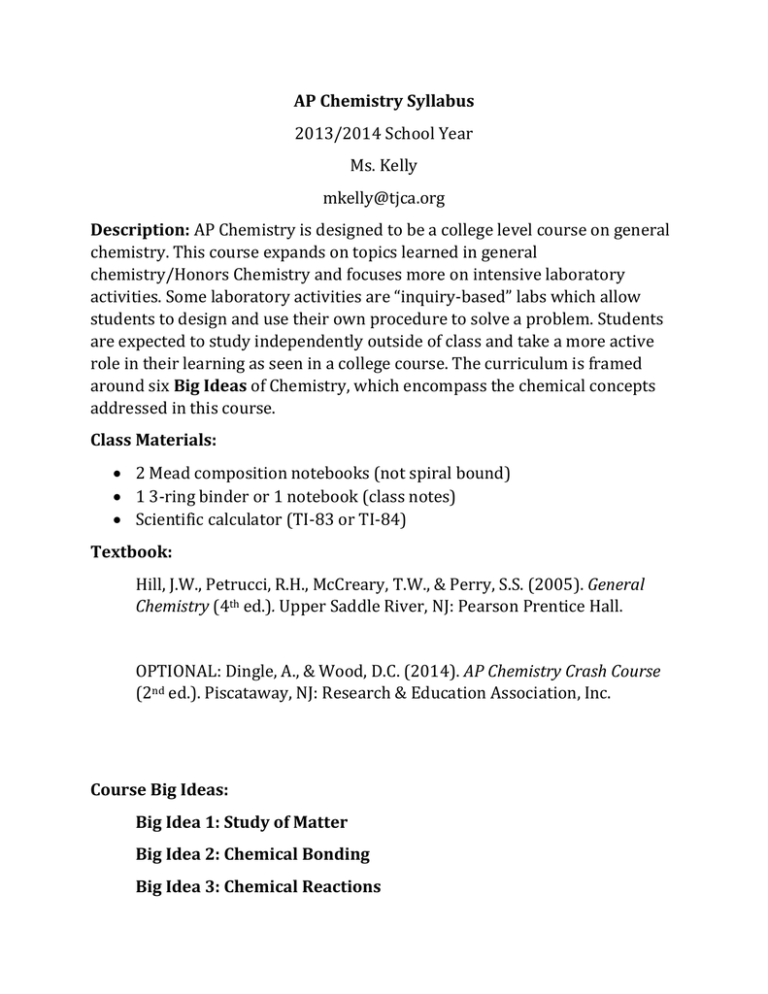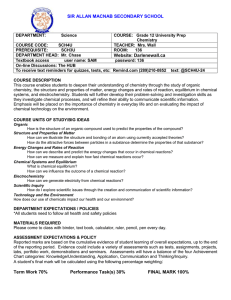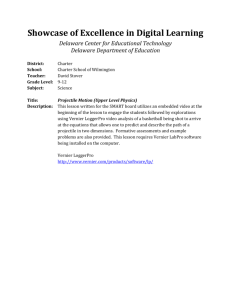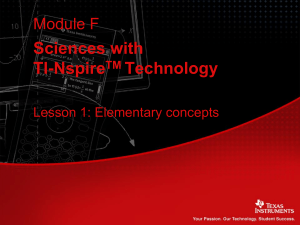
AP Chemistry Syllabus
2013/2014 School Year
Ms. Kelly
mkelly@tjca.org
Description: AP Chemistry is designed to be a college level course on general
chemistry. This course expands on topics learned in general
chemistry/Honors Chemistry and focuses more on intensive laboratory
activities. Some laboratory activities are “inquiry-based” labs which allow
students to design and use their own procedure to solve a problem. Students
are expected to study independently outside of class and take a more active
role in their learning as seen in a college course. The curriculum is framed
around six Big Ideas of Chemistry, which encompass the chemical concepts
addressed in this course.
Class Materials:
2 Mead composition notebooks (not spiral bound)
1 3-ring binder or 1 notebook (class notes)
Scientific calculator (TI-83 or TI-84)
Textbook:
Hill, J.W., Petrucci, R.H., McCreary, T.W., & Perry, S.S. (2005). General
Chemistry (4th ed.). Upper Saddle River, NJ: Pearson Prentice Hall.
OPTIONAL: Dingle, A., & Wood, D.C. (2014). AP Chemistry Crash Course
(2nd ed.). Piscataway, NJ: Research & Education Association, Inc.
Course Big Ideas:
Big Idea 1: Study of Matter
Big Idea 2: Chemical Bonding
Big Idea 3: Chemical Reactions
Big Idea 4: Kinetics
Big Idea 5: Thermodynamics
Big Idea 6: Chemical Equilibrium
(“AP Chemistry Course Details.” https://apstudent.collegeboard.org/apcourse/ap-chemistry/coursedetails.)
Grading:
A = 93-100, B = 92-85, C = 84-77, D = 76-70, F = 69 and < 69
Tests – 50%
Lab Reports —30%
Homework/Classwork—10%
Quizzes/DORs—10%
NOTE: All grades will be updated each Monday online. If the grades are
unable to be updated on a Monday, they will be updated ASAP. Tests
and lab reports take more time to complete and these updates will be
communicated to you in class.
Homework: Expect to have homework every day. Homework will be
taken up randomly but you are expected to complete each assignment
for success in this course.
Daily Oral Review (DOR): You will be expected to complete a brief
warm-up question at the start of the class period on previous material.
You CAN use your notes and ask for help from the instructor to
complete this activity. These assignments will be graded on a weekly
basis and you will not be required to make-up these activities in the
event of an absence (write ABSENT in your notebook).
Lab Reports/Quizzes/Tests: No late assignments accepted! If you are
absent, the due date is the next day you return to class. You must plan to
make-up a test or quiz the day you return to class. NO notes or outside
help may be used on quizzes and tests unless stated by the teacher.
Laboratory Component: You will be expected to write lab reports for
the majority of laboratory activities completed in this course. These
reports are to be written based on the format given to you. You MUST
read and sign the lab safety contract BEFORE participating in lab!!
Safety guidelines and teacher instructions MUST be followed at ALL
times during in the lab. NO EXCEPTIONS! **If a student has to sit out of a
laboratory experiment due to behavior after a warning, 10 points will be
taken off the lab report grade or 5 points will be taken off a lab postassignment.
Course Schedule: This schedule is tentative and is subject to change as we
progress through the academic year. Test, quiz, and lab dates are subject to
change as we progress through the material. Lab topics are subject to change
as well.
1st Semester (August 21, 2014—November 17, 2014)
August 21-22: Summer Assignment (quiz grade), lab safety, basic
math review, lab techniques
August 25th: Lab Safety and Equipment Quiz—(incorporated
into Test I)
August 25-29th: Atomic Theory
September 2nd: Atomic Theory Test
September 2-12th: Electron Configuration, Periodic Properties,
Quantum
September 4th: Determining a Solution’s Concentration Lab—
Vernier
September 11th: Inquiry Lab #1—Beer’s Law
September 16th: Periodic Trends Test
September 15-26th: Chemical Formulas/Stoichiometry
September 18th: Determination of the Percent Water Lab—
Vernier
September 25th: Inquiry Lab #7—Green Chemistry
September 30th: Chemical Formulas/Stoichiometry Test
October: Chemical Bonding, Hybridization
October 2nd: Liquid Chromatography Lab--Vernier
October 9th: Paper Chromatography Lab, Introduction into Inquiry
#5
October 23rd: Inquiry #5 Lab—Molecular Separation
October 31: Chemical Bonding Test
November 3-14th: Reaction Predictions
November 6th: Standardizing a solution of NaOH Lab--Vernier
November 13th: Redox Titration Lab
November 19th: Reaction Predictions Test
2nd Semester (November 18, 2014—February 27, 2015)
November 18-21st: Thermodynamics
November 20th: Determining the Mole Ratios in Chemical Reaction
Lab--Vernier
December 1-18th: Thermodynamics
December 4th: Determining the Enthalpy of a Chemical Reaction
Lab—Vernier
December 11th: Inquiry #12 Lab—Design your own handwarmer
December 18th: Thermodynamics Test
January 5-23rd: Kinetics/Equilibrium Basics
January 8th: Decomposition of Hydrogen Peroxide Lab—Vernier
January 15th: Rate and Order of a Chemical Reaction Lab--Vernier
January 22nd: Inquiry #11 Lab
January 27th: Kinetics Test
January 26-30th: Gases and Equilibrium
January 29th: Exploring the Properties of Gases Lab—Vernier
February 2-6th: Finish Gases and Equilibrium
February 5th: Molar Volume of a Gas Lab—Vernier
February 10th: Gases Test
February 9-27th: Acid/Base Chemistry
February 12th: Acid-Base Titration—Vernier
February 19th: Inquiry #4 Lab—How much acid is in common
drinks?
February 26th: Determining the Ka of a Weak Acid Lab—Vernier
3rd Semester (March 2nd—May 29, 2015)
March 2-5th: Finish Acid/Base Chemistry
March 5th: Buffers Lab—Vernier
March 10th: Acid/Base Test
March 9-27th: Electrochemistry
March 12th: Inquiry #15—What household materials have
buffering capability?
March 19th: Role-Play of Voltaic Cells, Lemon Battery, Start on
Salt-Water Cars
March 26th: Electroplating Lab—Vernier, Finish Salt-Water Cars
March 27th: Electrochemistry Test
March 30-April 6th: Spring Break
April 7-May 1st: Ksp and AP Chemistry Exam Review
April 9th: Determining the Ksp of calcium hydroxide lab-Vernier
April 16th: Determination of a Chemical Formula Lab--Vernier
April 23rd: Conductimetric Titration and Gravimetric
Determination of a Precipitate Lab—Vernier
May 4, 2015: AP Chemistry Exam!!
May 5-28th: Organic Chemistry Introduction, Biochemistry,
Additional Labs
May 7th: Make a Polymer
May 14th: Research and Formation of Volcanoes Lab
May 21st: Finish, Prep, and Activate Volcanoes Lab
Syllabus Review: Please fill out, detach, and turn in this portion of the
syllabus.
Student Name: _________________________________________
Parent Name (s): ________________________________________
Daytime Phone Number of Parent: ___________________________
Parent E-mail: ____________________________________________
Parents’ signature and date: _________________________________






